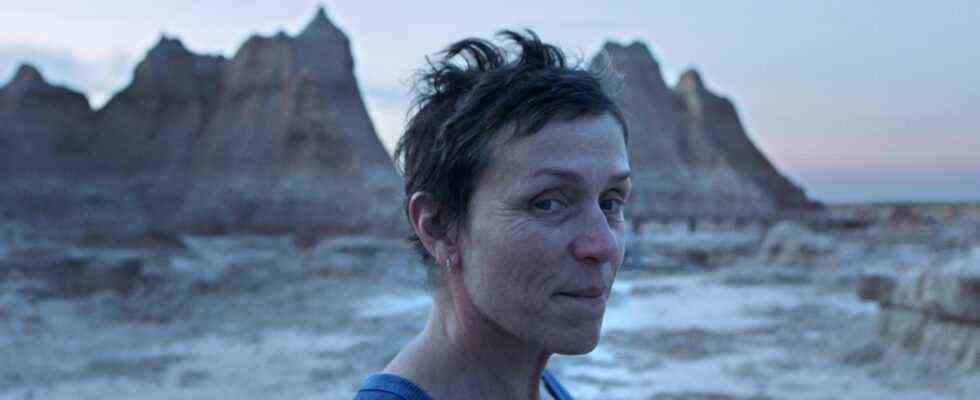It fits very well into these pandemic years that the main prize at the Oscars went to a film in which a stoic main character endures adverse circumstances, people largely avoid each other, are a lot in nature and nothing else happens.
A little something happens, of course, but Chloé Zhao’s “Nomadland” is a drama in which people are friendly to each other. There are hardly any arguments, nobody is cheating, nobody is murdered or exposed. The location is unglamorous, but America’s modern nomads share what little they have. They live in their vans because their pension is insufficient or they have not overcome other strokes of fate. You travel all over the USA. Sometimes they sit by the fire together. Are they so far on the edge that it seems futile to be against each other? Or is the absence of existing conflicts due to the main character?
This is Fern (Frances McDormand), who with her white van always stays just outside the reach of other people, even those who love her. The “homeless”, as she calls herself, is offered three times by friends and relatives to stay with them. Her sister almost begs her. But Fern repeatedly chooses her caravan, which she calls “Vanguard”, and the road. If she has to exit, she goes outside or uses a bucket in the van. She works as a temporary worker, first at Amazon, then in a national park, and later in a restaurant. Her hometown of Empire, Nevada was a working class town of the US Gypsum Corporation, which became a ghost town with the end of gypsum mining. She lived there with her husband until his death. Now she lives as a nomad among nomads.
“Nomadland” is a feature film with elements of a documentary, pearls of reality are woven into the storyline. Fern’s character is made up, but the film is based on the book “Nomadland: Surviving America in the Twenty-First Century” by Jessica Bruder. Some of the main characters have migrated from the book to the film: Charlene Swankie and Linda May, for example, are real nomads who play themselves here.
“Nomadland” doesn’t feel cynical, you can feel respect and love
One might wonder whether it is not Hollywood cynicism to use real work nomads as an authentic setting in a film that is carried by a star actress who also won an Oscar for it and continues to increase her already enormous market value. But “Nomadland” doesn’t feel cynical. This is mainly due to Frances McDormand. You can tell from the respect and love she feels for the amateur actors. She confronts them as equals. Your fictional fate is interwoven with that of the others.
In one of the most beautiful scenes in the film, Swankie, who has cancer in the film and does not want to be treated, tells of the moments on her journey when everything suddenly made sense. How she once got caught in a school of swallows while kayaking, and they were reflected in the water so that she felt like she was one of them. “I could have died at that moment and I wouldn’t have the feeling that I missed anything,” she says. Socially critical films are often either boring or they exploit their subject in a calculated manner. The line on which something really exciting happens and humanity has room without being denounced is very fine. Zhao manages exactly this balancing act.
In contrast to the book, the film is not a critique of capitalism in the classical sense. Anyone who expects this will be disappointed. The temporary workers are shown in their uprooting, but the halls of Amazon are clean and efficient. Fern jokes with the other employees, nobody is treated badly. If the movie characters get sick, they can afford costly treatments, which wouldn’t necessarily be the case in the real US. That is why the fear of financial loss is not the basic theme of the film, but rather that hidden fear that is inscribed in every road movie: What happens when you stop?
You usually die, which is why Thelma and Louise prefer to travel to eternity. In this respect, the film can also be read as subversive, because Fern reinterprets the constant mobility that globally networked capitalism enforces and the uprooting through the death of her husband into a self-chosen outsider role. Far away no longer stops. She hugs a tree once, but even it can’t hold her.
Nomad land, USA 2020 – Directed and written by Chloé Zhao. Camera: Joshua James Richards. Music: Ludovico Einaudi. With Frances McDormand, Charlene Swankie, Linda May, David Strathairn. Disney, 107 minutes.

